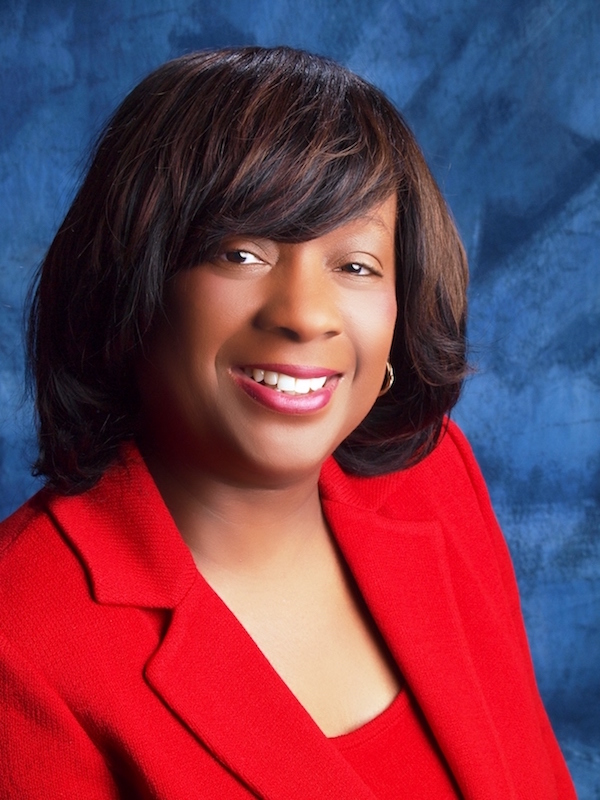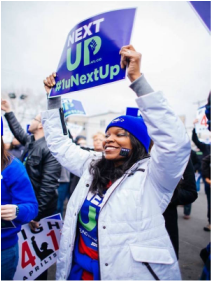Black Future Month
|
1. How do you think young women of color will continue to shape and change the direction of the labor movement? |
|
Diane: Women have long since been the victims of discrimination and women of color have suffered the most. Today women are joining unions at a higher rate than men, because a union contract offers recourse against oppression and prejudice. As women of color continue to rise through the ranks into leadership positions, they bring their experiences and voice to the decision making process. They will help decide Labor’s agenda and ensure a future inclusive of all workers’ issues.
Caniesha: I’ve worked in the Labor movement since 2007 and I have never been more excited about my work than I am right now. Because the issues and the conversations I see emerging around me, speak to me…they speak to my heart. I think the more that we see young women of color like Carmen Berkley at the AFL-CIO, Shanna Peeks at the UMWA, Rachel Bryan at IBEW, and so many more powerful young women stepping up in their union and in their communities we will continue to “wake up” more and more activists in the labor movement…the way that the leaders of the Black Lives Matter movement, who are young women of color, woke me up. |
2. How do you stay motivated in your work? |
Diane: I’m motivated by a heart-felt belief in making things better for generations coming behind me. As an African-American woman, I have had my share of struggles. However, my struggles were made less because of the women leaders who came before me. I want to help create a society where my daughter’s struggles and my granddaughters’ struggles are further diminished and sincerely hope that future generations don’t experience unfair treatment.
Caniesha: It's not easy. A culture of fear, complacency and resistance is peppered throughout my work around racial justice. But there is also solidarity, family in the struggle and hope. There are so many other strong and powerful women of color that are putting so much on the line. I am inspired by them and have to look to myself and say “what am I doing to make a difference?” Every time I expand on education around the issues that matter to the quality of life for my 7 year old black son with autism I can do nothing else but keep working. Every time I get to engage people in a conversation about racial justice I remain motivated. Every time I lean in to promote racial justice at my job, in my union and in my community I remain motivated. It's not easy. But the alternative is to give up? That's not acceptable. We have to contribute any way that we can if we want to see change…and I want to see change. |
3. Do you think there is a gap or divide between labor and other communities (Black, AAPI, LGBTQ, etc?)
|
Diane: How do you think we can bridge that? I think there used to be a gap between communities, but it is fading. Impacted communities realize that we need to work together regardless of our distinguishing characteristics. If society is to be made better through a progressive movement, no one group can do it alone. Lasting change is made when we work towards a common goal and I see that as the prevailing strategy now.
Caniesha: I do. I think we have to acknowledge and work on women’s issues, race issues, LGBTQ issues, all the other issues, in the “big” meetings. It’s nice to have constituency groups to work on these issues but how are these issues being addressed when decisions are being made in the labor community? Not by having side meetings where women meet with women and talk about women’s issues. As therapeutic and empowering as that is that won’t center those issues. In union spaces where women, people of color or LGBTQ people are present how many of those leaders are making sure that the other communities lens is applied when dealing with union business…that it’s just not the norm. I commute to work as a woman of color, I sit at my desk as a woman of color, I interact with customers as a woman of color, I provide for my family as a woman of color…in any of these situations, as a woman or a person of color my life and work experience can be altered. I think labor people have to realize that you can’t separate the other parts of union members from their jobs. When they do that, I think we see a resurgence of loyalty to the labor movement in these communities because they see the union supporting their families and the issues that they care about. |
|

